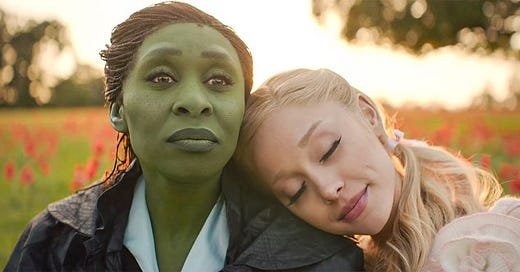THE DISRESPECTATIOUS STORYTELLING OF WICKED: or THE NOT-SO-WONDERFUL WRITING OF OZ
I recently watched Wicked — to distract myself from the coming inauguration and because I have to vote on it for something. Also, my youngest goddaughter asked me a question about the musical and I wanted to give her some kind of answer. Anyway, I had planned on screening it without my creative writing hat on, but then I saw some of the choices the film was making and I started scribbling.
As with my Dune and The Substance pieces, this isn’t a traditional review — I’m less interested in Wicked’s merits as a filmic objet d'art and more intrigued by the narrative shortcuts these productions take — and of course the lessons these choices offer to anyone interested in writing fiction.
If you happen to be among the One Percenters who ain’t heard of Wicked — the film is a John M. Chu directed musical adaptation of the first half of the long-running Broadway show — itself an airbrushed adaptation of Gregory McGuire’s far more disturbing and very un-Disney novel. In all versions Wicked is a revisionist re-telling of L. Frank Baum’s The Wonderful Wizard of Oz from the point of view of Elphaba, the Wicked Witch of the West, played in the film by Cynthia Erivo (whom I always love) with Ariana Grande as Glinda the Good Witch.
In all versions, Wicked lives or dies by its protagonist Elphaba, and while Erivo is a magnificent actor the script/story doesn’t really do her many favors. The Elphaba character doesn’t have a lot of depth, is overwhelmingly defined by her green-ness (which everyone in Oz seems exaggeratedly disgusted by, all the time, no matter how often she interacts with those around her) and to a lesser degree by her uncontrollable rage-magic (a rarity in any form). Green-ness and rage-magic are both Elphaba’s Distinctions and maybe her Troubles.
Elphaba’s green-ness performs triple duty by also being something close to a Want. Elphaba wishes she wasn’t green, wishes she was normal-hued, but this is not really a Want that the film frames as actionable. Elphaba doesn’t do what other kids born of despised complexions will sometimes do, doesn’t attempt to cover up her green or adapt a personality to mitigate its impact; Elphaba wants to be not-green the way certain couch-potatoes want to be ninjas, in a supremely passive, impossibly abstract low-energy sort of way.
Contrast this with Wicked’s secondary protagonist, Glinda. Glinda might not be meant to be as developed as Elphaba, but she also has Distinctions (wealthy, vain, narcissistic, oh-so-smugly-good — but also a bully) and a Want — Glinda wants to major in sorcery. Unlike Elphaba, however, the film shows Glinda actually pursuing this Want, putting dramatic energy into it — and even though Madame Morrible, Professor Emeritus and Dean of Sorcery Studies, snubs her repeatedly it is a Want that Glinda refuses to abandon.
More troubling from a protagonistic point of view, Elphaba only ends up in Shiz University because her father orders her to watch over her disabled sister Nessarose while she settles in. Two seconds later Elphaba’s rage-magic flares up and this explosion of power gains her instant admission to Shiz and to Madame Morrible’s special magic seminar.
Just to be clear: Elphaba, a racialized character played by an African-American woman, is admitted into university, no credentials necessary, and given advantage




